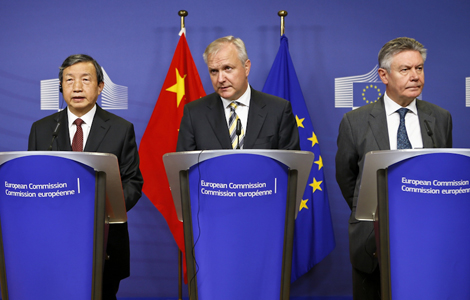Legislation speeded up to reduce pollution
Updated: 2013-10-30 23:59
By Zhu Zhe and An Baijie (China Daily)
|
||||||||
China plans to speed up the introduction of legislation related to environmental protection and resource management amid rising public concern over pollution.
A five-year legislative agenda revealed on Wednesday by the Standing Committee of the 12th National People's Congress shows that the top legislature wants to review 11 environment-related draft laws and amendments. In the legislative plan drafted five years ago, only seven fell in this category.
The standing committee, consisting of more than 170 members, was elected in March. Once a new committee is formed, it makes a legislative plan for its five-year tenure.
"The rise (of draft laws) in this category shows the top legislature's great concern for environmental protection and resource management," said Zhai Yong, director of the legislation department of the NPC's Environment and Resources Protection Committee.
"It also shows the country urgently needs to protect the environment and scientifically exploit natural resources," he said.
The number of environment-related draft laws is higher than in the previous legislative agendas, and they also touch on more concrete issues.
For example, planned laws and amendments on the new agenda cover the prevention and control of air pollution, water pollution and soil pollution. Basic ocean and nuclear security laws are also in the pipeline.
"All of these have clear targets and are practical in use," Zhai said.
In the previous legislative agenda, most environment-related laws dealt with macro policies such as the circular economy, land management, nature reserves and mineral resources.
Zhai said the latest move by the top legislature is in response to growing public awareness and concerns over the environment.
Zhang Dejiang, chairman of the NPC Standing Committee, said at a legislation meeting on Wednesday that legislators should listen to the public more and try to solve "real problems".
In recent years, smoggy weather, dirty water, toxic soil and polluted ocean water in China have constantly made media headlines domestically, and sometimes globally.
As the public has become more sensitive toward the environment, there have been a large number of mass incidents related to pollution, such as the construction of garbage incinerators.
Wang Qi, director of the Institute of Environment Project Technology with the Chinese Research Academy of Environmental Sciences, said that although many laws on environmental protection have been passed in recent years, environment legislation still lags behind social development.
Lu Hao, director of the NPC's Environment and Resources Protection Committee, said accelerating legislation in this sector is also in line with the Party's plans.
The document passed at the 18th National Congress of the ruling Communist Party of China last November also highlighted for the first time the importance of ecological progress and advocated the building of a "beautiful" China in the country's overall development plan.
"We feel honored and obligated," Lu said at Wednesday's legislation meeting.
He said the committee would work hard with relevant departments to ensure that the legislative plan is realized on time.
Lu also promised wide public participation in the legislative progress, which is also a requirement from top legislator Zhang.
Zhang repeatedly said at the meeting that the public has high expectations of the legislation and that legislators should listen to them more.
Public opinion must be heard through various channels during the lawmaking process, so that the legislation can balance the interests of people from different walks of life, he said.
But Zhang also stressed that the legislative work should based on China's practical situation and not blindly copy practices in other countries.
Zhai, from the legislation department of the NPC's Environment and Resources Protection Committee, said this is particularly the case when drafting environment- and resource-related laws, as such laws may slow down the GDP growth of some local regions in the short run.
"How to balance economic growth in the short term and long term needs dedicated deliberation and leaders' wisdom," he said.
Contact the writers at zhuzhe@chinadaily.com.cn and anbaijie@chinadaily.com.cn.

 Kung fu master becomes hit online
Kung fu master becomes hit online
 Color-blind love
Color-blind love
 Lenovo's new secret weapon: Hollywood star
Lenovo's new secret weapon: Hollywood star
 Brussels visit heralds closer trade ties for EU and China
Brussels visit heralds closer trade ties for EU and China
 Halloween gaining popularity but still sees cultural differences
Halloween gaining popularity but still sees cultural differences
 US embassy accused as 'spy hub'
US embassy accused as 'spy hub'
 Halloween beverage offers vampire experience
Halloween beverage offers vampire experience
 Lenovo launches new Yoga tablet
Lenovo launches new Yoga tablet
Most Viewed
Editor's Picks

|

|

|

|

|

|
Today's Top News
US business asks easing of market barriers
Benefit held for NYC official's ex-campaign treasurer
HIV epidemic needs education, not bath house bans
Tian'anmen jeep crash a terror attack
US spied on Chinese cities: report
Putin beats Obama in Forbes list
Legislation to help reduce pollution
Survey examines education gap
US Weekly

|

|






